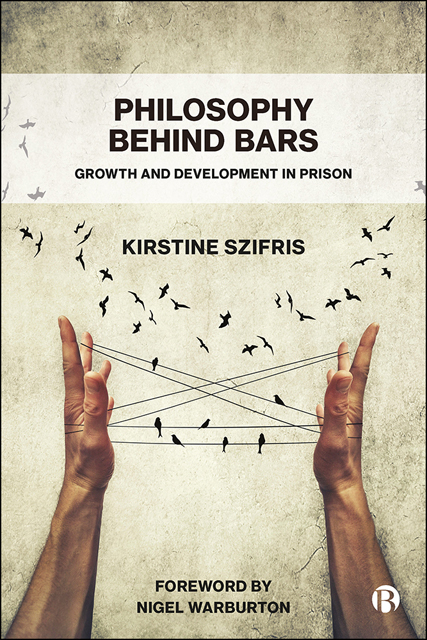Book contents
- Frontmatter
- Dedication
- Contents
- List of Boxes
- Acknowledgements
- Foreword
- 1 Philosophy, Identity and the ‘Ship of Theseus’
- 2 Towards Theory: People, Places and Voices
- 3 Survival, Plato and the Ideal Society
- 4 Kant, Bentham and the Question of Identity
- 5 ‘Why Do You Think That?’ Descartes, Hume and Knowledge>
- 6 Not Just an Offender, But a Person
- 7 Trying to Find a Community of Philosophical Inquiry
- 8 Finding Trust and Developing Relationships
- 9 Personal Self-Exploration
- 10 Towards a Framework for Understanding Philosophy in Prison
- 11 Final Reflections
- Appendix: Technical Methods
- Bibliography
- Index
4 - Kant, Bentham and the Question of Identity
Published online by Cambridge University Press: 15 April 2023
- Frontmatter
- Dedication
- Contents
- List of Boxes
- Acknowledgements
- Foreword
- 1 Philosophy, Identity and the ‘Ship of Theseus’
- 2 Towards Theory: People, Places and Voices
- 3 Survival, Plato and the Ideal Society
- 4 Kant, Bentham and the Question of Identity
- 5 ‘Why Do You Think That?’ Descartes, Hume and Knowledge>
- 6 Not Just an Offender, But a Person
- 7 Trying to Find a Community of Philosophical Inquiry
- 8 Finding Trust and Developing Relationships
- 9 Personal Self-Exploration
- 10 Towards a Framework for Understanding Philosophy in Prison
- 11 Final Reflections
- Appendix: Technical Methods
- Bibliography
- Index
Summary
“Morality is behaviour”, Toby asserts with certainty. A resident of a mainstream wing in HMP Full Sutton, Toby is older, well read, and very opinionated. I respond by asking whether some behaviours have a moral dimension while others do not. Toby moves on to discussing piety, and whether the fact that being more pious made one of the nurses more moral.
Gerry, the writer-in-residence who attended the philosophy session alongside the men, said she did not see the diff erence between the two women because they acted the same. Jonny, also older, confi dent and clear in his articulation of ideas, said, “It's the outcome that would matter – the one acting out of compassion, she might find it too difficult to do the job.” We talk about the two nurses, about duty, about morality. What does it mean for something to be moral?
Discussing morality with people in prison involves some sensitivity. As Liebling argues, prisons have ‘moral or relational climates’ (2019, p 82), such that the experience of daily life is acutely affected by the values of the institution (see also Liebling, 2004). On this occasion, however, my concern over the direction of conversation related to Toby's contribution. He jumped in by saying “‘morality’ is a religious word”. His assertion is loaded with meaning. In his pre-participation interview, when asked why he wanted to participate in philosophy, he responded by saying (in a loud, authoritative, somewhat over-thetop voice) that he wanted to “… rescue these young black men from the grapples of Islam.” For him, a black man in his late 60s, the rate of young black men in the prison converting to Islam was of great concern. As a self-educated man with a seemingly vast knowledge of philosophers (he roundly chastised me for neglecting Mary Wollstonecraft in my teachings) and history, who was well travelled, and worldly-wise in his way, Toby felt that moving towards religion and, in his eyes, away from reason, logic and science, was dangerous. Philosophy, for him, was the answer. Philosophy was a means to help change this narrative.
- Type
- Chapter
- Information
- Philosophy behind BarsGrowth and Development in Prison, pp. 55 - 74Publisher: Bristol University PressPrint publication year: 2021

